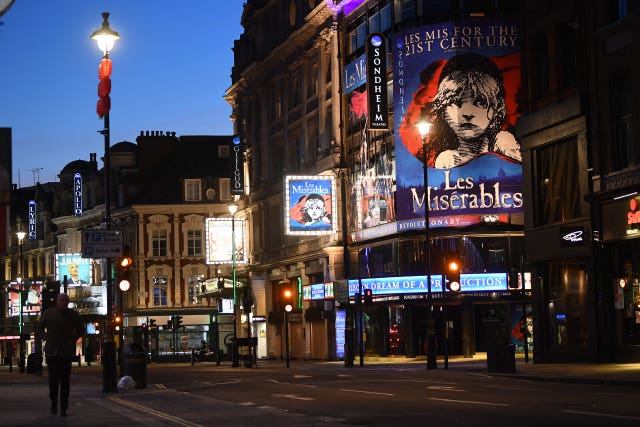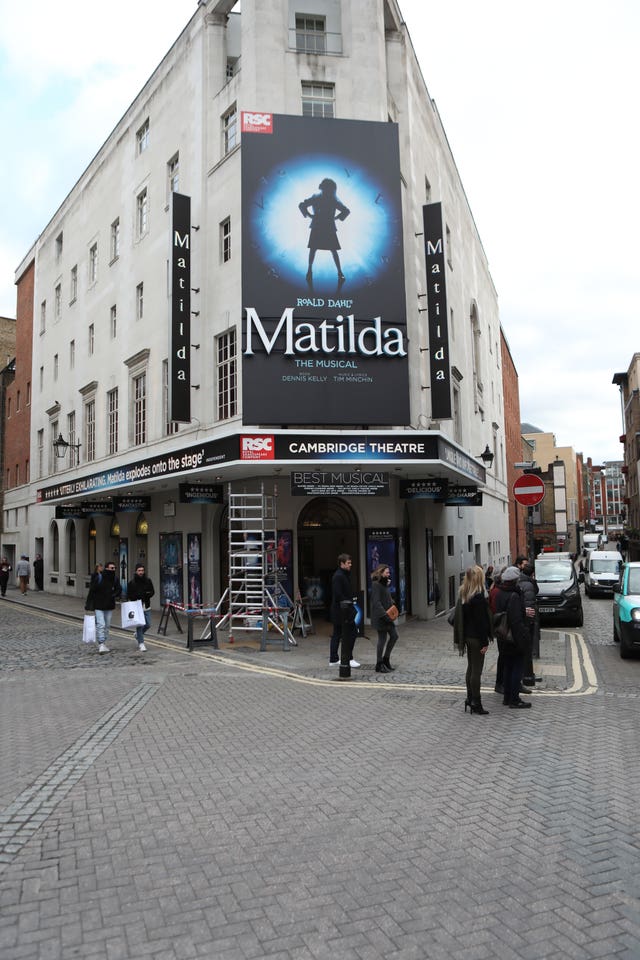‘Bah humbug’: Theatre producer Cameron Mackintosh hits out at London Tier 3 move
New restrictions mean entertainment venues will have to close in the capital and parts of Essex and Hertfordshire.

Sir Cameron Mackintosh has said the Government’s decision to put London into Tier 3 of coronavirus restrictions is “devastating” and “smacks of panic”.
The theatre producer said the “volte-face” by the Government damages theatre and the wider economy.
Under the new restrictions, which also apply to parts of Essex and Hertfordshire, entertainment venues including theatres, concert halls, art galleries, cinemas and museums must close from Wednesday.
In a statement, Sir Cameron added that the move “makes all our considerable and costly efforts to ensure the safety of both performers and audiences alike, widely praised by the health authorities, seem worthless”.

Sir Cameron is currently putting on Les Miserables in the West End.
He added: “We have almost 100 mostly self-employed performers and staff working on Les Miserables – The Staged Concert at the Sondheim Theatre.
“At a stroke, this government has tipped them into unemployment just in time for Christmas – Bah Humbug to the Prime Minister and the men in white coats.
“We will have to disappoint thousands of patrons over the next few weeks who were booked to safely see Les Mis over the holidays.”
Michael Harrison, director of the Pantoland pantomime which opened at the London Palladium on Saturday, said he is “deeply concerned” about the financial impact of Tier 3 restrictions on the West End.
He added: “Whilst the safety and health of our visitors, staff and performers is of extreme importance, the Government’s yo-yoing approach on advice is frankly appalling.”

Culture Secretary Oliver Dowden was also in attendance.
Discussing Mr Dowden’s visit, Mr Harrison said he was “thrilled to see him crying with laughter”.
He added that “it’s just a shame my entire cast and company are now crying because of the Government’s decision to put London into Tier 2 just 12 days ago encouraging us all to press on with our productions only to realise that was in fact a mistake”.
Actress Elaine Paige, who is starring in Pantoland, said she is disappointed that the theatre has to close.
She tweeted: “Oliver Dowden saw it for himself. And yet tubes & flights still allowed?
“These rules are illogical. The audience response shows how desperate they are for 2hrs of escapism. If its so terrible – cancel Christmas!”
Andrew Lloyd Webber, who owns the London Palladium, said it seems “arbitrary and unfair” that theatre performances are being banned while shopping is allowed to continue.
The composer said despite his concerns for the sector he “reluctantly” agrees with the decision to put London into Tier 3
He added: “But I do hope that even a crumb of the £1.57 billion made available for the arts could be given to those who have spent an enormous amount of time and money to mount productions for this season and to support the actors, musicians and stage crews who will yet again be put out of a job.”
The Creative Industries Federation said the Tier 3 announcement is “devastating news” for London’s creative sector.
A tweet from the trade body said: “Devastating news for London’s £58bn creative sector, particularly for the many who will see a total loss of income due to today’s Tier 3 announcement.
“Greater support inc insurance for those planning future performances & events is needed for all parts of UK facing restrictions.”
Jon Morgan, director of the Theatres Trust, an advisory public body for theatres, said the Health Secretary’s announcement has “compounded” a difficult year for the sector.
Mr Morgan said: “It is a disaster for London’s theatres that the capital and parts of Essex and Hertfordshire will move into Tier 3.
“Theatres have worked incredibly hard to create safe environments for audiences and through no fault of their own will now face enormous financial losses.
“They have done so at great risk as it is currently impossible to secure production insurance.”

“2020 has been a catastrophic year for theatre and today’s announcement has compounded that,” Mr Morgan added.
Julian Bird, chief executive of Society of London Theatre and UK Theatre, the membership organisations which aim to promote the sector, said it was “truly a devastating day” for the industry and questioned what scientific evidence supports closing theatres.
He told the PA news agency: “People have invested huge amounts of money getting productions up and running. We’ve got staff that will be left over Christmas with no income.
“So, it is truly a devastating day. I think particularly coming having just reopened after the four-week national restrictions. And now with Christmas approaching, we’re going to have freelancers, actors, musicians, staff, crew with no income.”
Mr Bird called on the Government to offer more support to freelancers and said there was a sense of gloom among workers.
He added: “I repeat, we don’t understand the evidence for why theatres as buildings should have to close. We operate incredibly Covid-safe facilities.
“There’s no evidence of spread, of risk of spread within the buildings. And we just want to get back to entertaining the public and giving them a good time.”
Writing in The Telegraph, she added: “All the effort and energy, not to even mention the expense, of re-opening shows safely has once again been undercut by a decision that will devastate our industry and its freelance workforce – many of whom have still not received any Government support and now face a further loss of employment.”
Current Tier 2 restrictions in the regions allow for socially distanced performances to take place, while galleries and museums could also welcome visitors.
However, entertainment venues now find themselves having to shut up shop once again after the lockdown in England came to an end on December 2 and planned performances across the region will now have to be scrapped.
A DCMS spokesperson pointed to the Government’s £1.57 billion Culture Recovery Fund and said it remains “completely committed” to supporting the arts industry during the pandemic.
They added: “We held back £400 million of contingency funding so we could respond to the changing public health context and will now use it to support organisations facing financial distress as a result of closure, as well as helping them transition back to fuller opening in the spring.”





